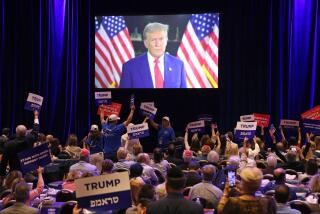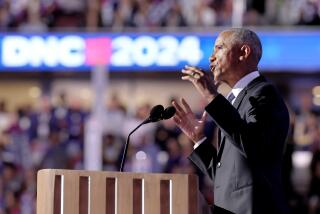Candidates Tiptoe Into N.Y. Minefield--So Stay Tuned : Politics: The state is a wild, wacky world of special interests and fierce rivalries--plus a menacing media.
- Share via
NEW YORK — Mayor David N. Dinkins orders both Bill Clinton and Edmund G. (Jerry) Brown Jr. to a summit meeting to find out precisely what they can offer urban America. Former Mayor Edward I. Koch declares both candidates are losers and is pitching for a protest vote.
Popular radio talk show host Don Imus labels Clinton “Slick Willie” and compares the Arkansas governor to discredited preachers Jimmy Swaggart and Jim Bakker. The next morning, Imus tees off on Brown, declaring: “This clown reinvents himself every 20 minutes.”
Stay tuned. The New York Democratic primary campaign--with a huge cache of 244 delegates at stake on April 7--has just begun.
It is a wild, wacky world where presidential candidates have to tiptoe through minefields of special interests, ethnic and geographic rivalries, Democratic Party fights and clashing personalities, all while contending with menacing media.
“Politics is blood sport to the New York media, and the candidates had better bring tourniquets,” said Maureen Connelly, a veteran media consultant and political operative in the Empire State.
“Welcome to New York. Here is the number for the Emergency Medical Service. Call 911,” campaign consultant David Garth advises the presidential contenders.
“It ain’t Kansas,” he said. “ . . . New York politics is so Byzantine, it takes you two weeks to find out where the door is, and then you are quite happy to leave town.”
Sometimes, candidates leave town in tatters. In 1988, Koch declared that Jews and supporters of Israel “would have to be crazy” to vote for the Rev. Jesse Jackson. The ensuing uproar over the racially divisive remark engulfed Koch’s and Garth’s candidate, Tennessee Sen. Albert Gore Jr., who lost badly and shortly thereafter ended his candidacy.
This time, with Jackson not running, New York’s feisty former mayor--who still enjoys an enthusiastic constituency--has focused on both Clinton and Brown.
“My own view is if the Democratic Party selects either one at the convention, then George Bush has a walk in,” Koch said. “He must be smiling every day when he wakes up in the morning and smiling even broader when he goes to bed at night. . . . If we want to win, we must come up with someone who is credible.”
Democratic presidential politics has changed dramatically since the spring of 1960 when Sen. John F. Kennedy’s operatives could quietly court a handful of powerful bosses and walk away with 87 of New York state’s 114 votes at a caucus. It has changed since Richard Wade, a savvy, quiet-spoken urban historian could deliver the state to Sen. George S. McGovern by fashioning a formidable grass-roots organization in the 1972 primary.
And “New York is a vastly changed place since four years ago,” said political consultant Ron Maiorana.
In 1988, Jackson ran an impressive campaign, carrying New York City with a massive turnout of minority voters, but losing the state to Gov. Michael S. Dukakis of Massachusetts. Unlike that year, when New York’s economy was booming, the state has been hard hit by the recession. Latest figures show the jobless rate at 10.9% in New York City.
Integrity, character and honesty seem paramount issues, not an urban or minority agenda, as in the last primary. The debate this time is not over the direction of the party--but whether the party and the process are so flawed that they need massive surgery.
Still, some things remain the same. Presidential contenders must walk a tightrope between constituencies and personalities over a wide range of issues: Jewish voters and Israel; gays and AIDS; blacks and Haitian refugees; the Irish and Northern Ireland.
And the mayor can still steal the headlines. This year, Dinkins summoned Clinton and Brown to a meeting with other mayors next week as a way to raise the profile of problems cities face.
Gov. Mario M. Cuomo is a figure to be courted--and feared for his comments that can pierce a candidate’s well-crafted armor.
“If there is a problem that exists anywhere in the country, magnify it by the nth degree, and it is the situation in New York,” said Connelly. “You have a number of well-organized special interest groups. The list is endless. There are foreign policy considerations--Israel. In terms of ethnicity, (you may need to know that) there is a Hungarian speaking minority in Romania. Candidates’ resources are very scarce and the demands are extraordinary in New York.”
“You have a lot of special interest groups, each wanting to have their priorities accepted,” said Koch. “You also have in the state the strains between mainstream Democrats and more radical Democrats who like to call themselves progressives. . . . You put that all together. That is like throwing two cats into a barrel.”
In the New York primary, Clinton and Brown find themselves in the midst of a tough tabloid war and intense competition between local television stations. “Aggressive” can be a vast understatement for New York’s pit bull press corps.
Clinton was alternately dubbed “Wild Bill” and the “Luv Guv” in headlines when he was battling allegations of adultery. Now even his wife is a target. A recent New York Post columnist called her a “buffoon” and “radical feminist.”
Imus refers regularly to Brown as “moonbeam.” Shock radio disc jockey Howard Stern, who has had Brown on his show and once asked to be named Secretary of the Vagina, now bitterly complains that Brown is ignoring him.
“Now we have two targets,” said Gabe Pressman of WNBC-TV, the dean of television political reporters. “There is an adversarial, irreverent attitude. It is probably a culture shock for some of these guys from other states. . . . We are trained to pursue.”
And the stakes are higher this year than in other presidential primaries. In July, the Democratic National Convention will be held in New York City.
“It could be undecided coming into the convention,” observed Garth. “The kind of friends you make now could be very important to you in July.”
More to Read
Get the L.A. Times Politics newsletter
Deeply reported insights into legislation, politics and policy from Sacramento, Washington and beyond. In your inbox twice per week.
You may occasionally receive promotional content from the Los Angeles Times.










